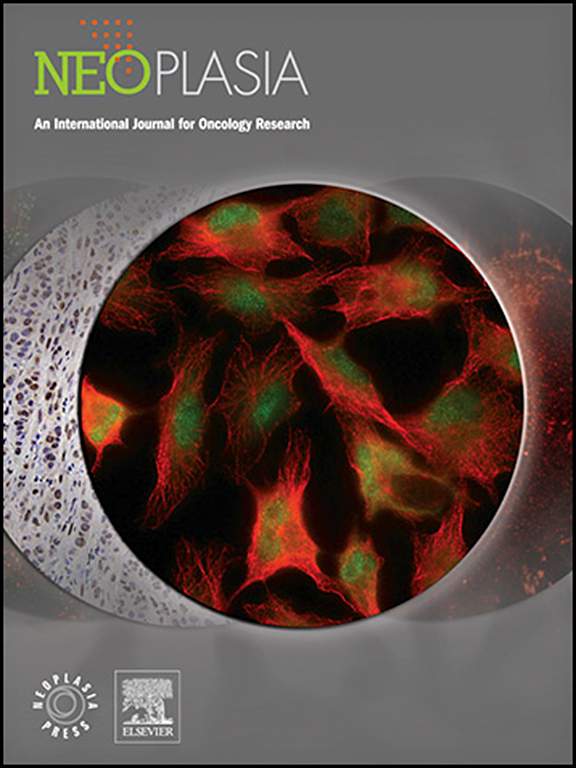脑脊液无细胞DNA谱分析在非小细胞肺癌伴轻脑膜转移患者中的临床应用及预测价值
IF 4.8
2区 医学
Q1 Biochemistry, Genetics and Molecular Biology
引用次数: 0
摘要
轻脑膜转移(LM)是非小细胞肺癌(NSCLC)的一种具有挑战性的并发症。使用新一代测序(NGS)对脑脊液(CSF)无细胞DNA (cfDNA)进行分析,可以深入了解耐药机制和潜在的治疗策略。我们于2022年2月至2023年4月进行了一项研究,涉及来自台湾五家医院的复发或晚期NSCLC合并LM的患者。这些患者使用118个NGS基因靶向面板进行CSF cfDNA分析,并收集了全面的临床数据。在25例入组患者中,22例(88.0%)有EGFR突变,3例(12.0%)有EML4-ALK融合、KIF5B-RET融合和ERBB2 A775_G776insSVMA。27份样本(来自25名患者)的CSF cfDNA测序均证实了其原始驱动突变。在整个队列中,18名患者(72.0%)接受了鞘内培美曲塞(ITP)治疗,从ITP开始到死亡的中位生存时间为7.4个月(95.0%可信区间,3.3-11.6)。其中10只(55.6%)存活超过6个月。值得注意的是,MET拷贝数增加(CNG)与ITP后超过6个月的生存时间显著相关(p = 0.007)。EGFR T790M和EGFR非依赖性耐药改变的共存与ITP后较短的生存时间相关,中位生存时间为1.9个月,而没有EGFR T790M的患者为9.9个月(p = 0.010)。我们的研究结果突出了CSF cfDNA NGS在LM耐药理解和ITP疗效预测方面的潜力。MET CNG对ITP受者的生存有积极影响,而EGFR T790M和EGFR非依赖性耐药机制的共存导致预后不佳。本文章由计算机程序翻译,如有差异,请以英文原文为准。
Clinical utility and predictive value of cerebrospinal fluid cell-free DNA profiling in non-small cell lung cancer patients with leptomeningeal metastasis
Leptomeningeal metastasis (LM) is a challenging complication of non-small cell lung cancer (NSCLC). Cerebrospinal fluid (CSF) cell-free DNA (cfDNA) analysis using next-generation sequencing (NGS) offers insights into resistance mechanisms and potential treatment strategies. We conducted a study from February 2022 to April 2023 involving patients from five hospitals in Taiwan who had recurrent or advanced NSCLC with LM. These patients underwent CSF cfDNA analysis using a 118-gene targeted panel for NGS, with comprehensive clinical data collected. Among 25 enrolled patients, 22 (88.0 %) had EGFR mutations, while three (12.0 %) had EML4-ALK fusion, KIF5B-RET fusion, and ERBB2 A775_G776insSVMA. CSF cfDNA sequencing of 27 samples (from 25 patients) all confirmed their original driver mutations. Of total cohort, 18 patients (72.0 %) underwent intrathecal pemetrexed (ITP), with a median survival time of 7.4 months (95.0 % confidence interval, 3.3–11.6) from the initiation of ITP to death. Among them, ten individuals (55.6 %) survived beyond 6 months. Notably, MET copy number gain (CNG) correlated significantly with survival time exceeding 6 months after ITP (p = 0.007). The coexistence of EGFR T790M and EGFR-independent resistance alterations was associated with shorter survival times after ITP, with a median survival time of 1.9 months compared to 9.9 months for those without EGFR T790M (p = 0.010). Our results highlight CSF cfDNA NGS's potential in LM resistance understanding and ITP efficacy prediction. MET CNG positively impacts survival for ITP recipients, whereas the coexistence of EGFR T790M and EGFR-independent resistance mechanisms leads to poor outcomes.
求助全文
通过发布文献求助,成功后即可免费获取论文全文。
去求助
来源期刊

Neoplasia
医学-肿瘤学
CiteScore
9.20
自引率
2.10%
发文量
82
审稿时长
26 days
期刊介绍:
Neoplasia publishes the results of novel investigations in all areas of oncology research. The title Neoplasia was chosen to convey the journal’s breadth, which encompasses the traditional disciplines of cancer research as well as emerging fields and interdisciplinary investigations. Neoplasia is interested in studies describing new molecular and genetic findings relating to the neoplastic phenotype and in laboratory and clinical studies demonstrating creative applications of advances in the basic sciences to risk assessment, prognostic indications, detection, diagnosis, and treatment. In addition to regular Research Reports, Neoplasia also publishes Reviews and Meeting Reports. Neoplasia is committed to ensuring a thorough, fair, and rapid review and publication schedule to further its mission of serving both the scientific and clinical communities by disseminating important data and ideas in cancer research.
 求助内容:
求助内容: 应助结果提醒方式:
应助结果提醒方式:


